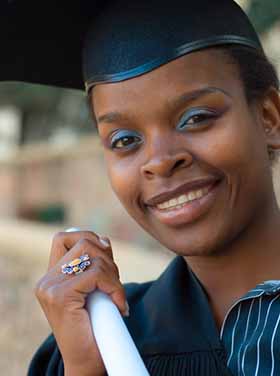One of my SHEros is Fannie Lou Hammer. Ms. Hammer was a civil rights activist, she was particularly key in advancing Blacks voting rights in the State of Mississippi. She once said, “You can pray until you faint, but unless you get up and try to do something God is not going to put it in your lap.” I thought of her words as prophetic when reading an article this morning.
The commentary released last week is entitled “African-American Women Now Top the List of Most-Educated Group in the Country” featured on Alternet.org by Kali Holloway is eye-catching. The feature highlighted a study by the National Center of Education Statistics (NCES) that found when examining educational achievement, African-American women have the highest educational outcomes across any demographic. Hence, when looking at the percentage of degrees by sex and race for 2009-2010, 62% of associate’s degrees were conferred by females, with more women than men earning degrees across each race. This difference between genders was highest among the Black graduates. Black women earned 68.3% of the associate degrees awarded to African American’s in 2009-2010. At the baccalaureate level, women earn 57.4% of all BA/BS degrees but for African Americans two-thirds of those with baccalaureates are female in contrast to 56% White, 60.7% Hispanic, 54.5% Asian/Pacific Islander, and 60.7% of American Indian/Alaska Native women have a BA or BS degree.
Similar patterns hold true for postbaccalaureate degrees. Overall, women earn 62.6% of master’s degrees but African American women hold the largest share of masters when looking by race and gender at 71.1%. Overall, more than half of doctorates awarded in 2009-2010 were awarded to women. Women in each racial group reflected in the NCES study earned a higher percentage of the PhDs, EdDs, or MDs awarded than men. The percentage of doctoral degrees earned, by women in each race, were: White 55%, Hispanic 55%, Asian/Pacific Islanders 56.5%, and 54.8% American Indian/Alaska Native 54.8%, and Black 65.2%.
The aforementioned statistics are encouraging, demonstrate increased access and persistence. However, this does not acknowledge the unique confrontations Black females experience in P-20 education when compared to their peers. Research has identified core challenges (e.g., stereotype threat, pressure to prove their intellectual ability, macroaggressions, racial battle fatigue, sexism, etc.) that shape Black girls' success in school and college, the literature also notes their resiliency to traverse chilly educational climates (Baldwin, 1987; Campbell, 2012; Evans-Winters, 2005; Stambaugh & Ford, 2015). There is a common assumption that Black girls and women are exempt from some of the interventions for Black boys and men when the truth is both stand to benefit from guidance on rejecting microaggressions based on their unique characteristics, externalizing microinvalidations, and tackling predicaments with support. In spite of the great gains, there is still work to be done in addressing the successes of Black girls and women amid having to square off with formidable structures that present catch-22s (e.g., misconceptions that all Black females have made it, don’t have racialized gender role strain, already have agency and are not burdened to perform gender in school and work).
Over the course of the 2015-2016 academic year, OCCRL has hosted Twitter Live Chats that cut across an array of topics germane to pathways to and through college that advance equitable student outcomes. In late April, our Twitter Live discussion focused on Black Girl Excellence #BlackGirlExcellence. The conversation was robust and engaging yet only scratched the surface of the issues and dilemmas that emerge as problematic for African American females across the educational pipeline. We look forward to continuing the dialogue in this area in addition to raising the conversation on equity and outcomes affecting student groups across the spectrum of difference in the months to come.
References
- Baldwin, A. Y. (1987). I'm black but look at me, I am also gifted. Gifted Child Quarterly, 31(4), 180-185. doi: 10.1177/001698628703100410
- Campbell, S. L. (2012). For colored girls? Factors that influence teacher recommendations into advanced courses for black girls. The Review of Black Political Economy, 39(4), 389-402. doi: 10.1007/s12114-012-9139-1
- Evans-Winters, V. E. (2005). Teaching black girls: Resiliency in urban classrooms (Vol. 279). Peter Lang.
- Holloway, K. (2016). African-American women now top the list of most-educated group in the country. Alternet, Independent Media Institute.
- National Center for Educational Statistics. (2012). Degrees conferred by sex and race. Washington, DC: Author.
- Stambaugh, T., & Ford, D. Y. (2015). Microaggressions, multiculturalism, and gifted individuals who are black, hispanic, or low income. Journal of Counseling & Development, 93(2), 192-201. doi: 10.1002/j.1556-6676.2015.00195.x
- Zamani-Gallaher, E. M., & Polite, V. C. (Eds.). (2013). African American Females: Addressing Challenges and Nurturing the Future. Michigan State University Press.
